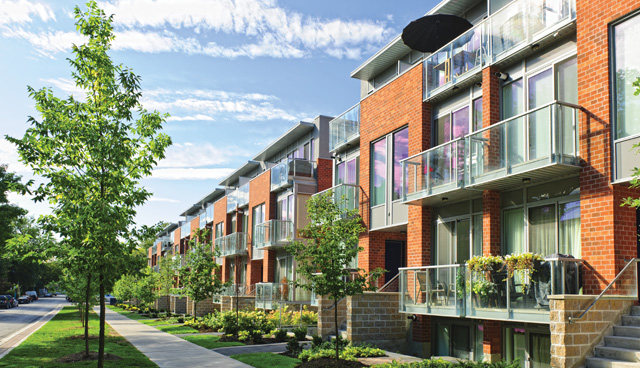
Innovative homelessness solutions
17th May 2019
Neighbourhood regeneration
17th May 2019Apartment living

Compared with our European neighbours, Ireland has a relatively small proportion of our population living in apartments — about 7 per cent compared to the EU norm of closer to 40 per cent. However, in recent years, the number of apartments has increased considerably — between 2002 and 2016 there was an 85 per cent increase in apartment living, writes David Rouse.
Smaller household sizes, rising land costs, tax incentives, and reductions in affordability of traditional three-bedroom semi-detached houses are just some of the factors explaining the increase. Indications from the planning permissions system in the period since 2016 point towards continued expansion in apartment numbers.
With a more diverse and mobile population mix, trends reverting to city-centre living, and a continuing reduction in household sizes, apartment living is likely to play an increasingly important role in meeting Ireland’s housing needs. Institutional landlords in the private residential sector are opening up new tenure streams. A small but expanding number of apartment estates are now managed by specialist corporate providers.
Approved Housing Bodies continue to acquire homes in multi-unit developments. Yet tenants of non-institutional and “accidental” private landlords, together with conventional owner occupiers, still constitute the largest category of apartment residents.
Sustainability
The Central Statistics Office estimates a population increase of between 5.5 and 6.7 million people over the period to 20511. Recognising the projected rise, government policy as set out in publications such as the National Planning Framework, and Rebuilding Ireland, now focuses on increasing residential densities in our towns and cities. Broad agreement has been reached on the unsustainability of urban sprawl. With these changes comes a need for more apartment blocks, to achieve greater efficiency in land use, better connectivity to public transport and a move away from reliance on the private car, and greener waste policies.
Shared amenities such as children’s playgrounds, community facilities, and public realms of a high quality make for attractive apartment estates. Avoidance of over-concentrations of any one tenure type can contribute towards community development, resilience, and sustainability over time.
Funding and governance
Failure in on-time payment of properly budgeted management fees, also known as service charges, is one of the main limitations to the success of many estates. Management fees are the lifeblood of the owners’ management company (OMC).
The OMC is the collective body through which shared services (e.g. bin collection and block insurance) and estate common areas are managed. It is essential that all property owners, owner-occupiers and landlords alike, pay their fees. Payment by instalment can help in cases of hardship.
Another challenge for apartment estates is the extent to which the management fee is enough to cover future big-ticket expenses, such as lift replacement, roof repair, and major redecoration projects. To ensure future upkeep, a building investment fund (or sinking fund) needs to be set up from the very start of the life of the estate.
In apartment developments where there is a mix of owner-occupiers, private renters, and social or public tenants, the OMC plays an essential role in manging residents’ rights and obligations. Under the stewardship of volunteer directors drawn from the wider body of owners, in order to succeed the OMC requires participation from all stakeholders.
Board members from housing bodies offer tenure expertise, and confidence on tenant suitability. When it comes to setting budgets, tendering for services, or pricing insurance, the commercial knowledge of landlords who serve as OMC directors can promote sound financial management. Owner-occupier directors are fully invested in the estate and possess lived experience of its successes and shortcomings.
Employment of a good property management agent by a competent OMC board ensures the smooth running of an estate. Licensed by the Property Services Regulatory Authority, and usually a member of a professional body, a proactive agent can make all the difference to residents’ experiences.
Legacy construction defects arising during the so-called Celtic Tiger period are seen as a drag on acceptance of apartment living. Corrective measures will encourage the restoration of confidence.
Other trends
The advent in Ireland of the institutional landlord, be that a Real Estate Investment Trust (REIT), international investment fund, or other corporate provider, can bring new approaches to apartment management.
The internationally mobile cohort of a workforce typically has housing needs that differ from those of residents with stronger or deeper ties to a locality. A variety of tenures, a wider range of on-site managed services, such as laundry and entertainment, and diversity in home configurations, are some of the innovations available through the build-to-rent model.
Maturity
Reforms of funding and governance, confrontation of legacy issues, and greater involvement of tenants should help to address some of the negative perceptions in Ireland of apartment living. The regulation of service providers to the sector continues to improve; management agents are by law now required to undertake minimum levels of training and professional development.
Greater public awareness of the variety of tenures on offer, and of the benefits and efficiencies of high-quality shared amenities can contribute to successful apartment living.
1. Population and Labour Force Projections 2017–2051
David Rouse recently joined the Housing Agency as an Advisor on Owners’ Management Companies and the Multi-Unit Developments sector.
T: 01 656 4100
E: david.rouse@housingagency.ie
W: www.housingagency.ie









